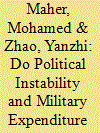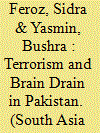| Srl | Item |
| 1 |
ID:
187361


|
|
|
|
|
| Summary/Abstract |
Previous studies have investigated the relationship between political instability and economic growth separately from the relationship between military expenditure and economic growth. Besides, they did not cover the period after 2011 (i.e. the Arab Spring and its consequences). Therefore, this paper attempts to empirically analyze the long-run and short-run impacts of both political instability and military expenditure on economic growth in Egypt. We estimate the autoregressive distributed lag (ARDL) approach using data on the Egyptian economy over the period 1982–2018. For the robustness of our results, we use the fully modified ordinary least squares (FMOLS) estimator. Results of the ARDL approach indicate a significant negative relationship between political instability and economic growth in both the long-run and short-run. Contrarily, military expenditure has an insignificant impact on economic growth, especially in the long-run. These results are confirmed by the FMOLS estimator. Moreover, the estimated coefficient on the one-period lagged error correction term (ECTt-1) indicates that deviations from the long-run equilibrium relationship are corrected within a year.
|
|
|
|
|
|
|
|
|
|
|
|
|
|
|
|
| 2 |
ID:
178428


|
|
|
|
|
| Summary/Abstract |
This article examines the nexus between financial inclusion index and economic growth in all eight South Asian Association for Regional Cooperation (SAARC) countries, using annual data from 2004 to 2017. In order to determine the possible long-run relationship between these variables, the study adopted the Pedroni panel co-integration test and two types of co-integration regression methods, the Fully Modified Ordinary Least Square (FMOLS) and the Dynamic Ordinary Least Square (DOLS) methods. The Pedroni panel co-integration test confirms the existence of a long-run relationship between financial inclusion and economic growth in the SAARC countries. The coefficients of FMOLS and DOLS indicate that the index of financial inclusion and selected control variables together support economic growth. In addition, the Granger causality test confirmed bi-directional causality between FI and economic growth.
|
|
|
|
|
|
|
|
|
|
|
|
|
|
|
|
| 3 |
ID:
178433


|
|
|
|
|
| Summary/Abstract |
This study empirically investigates the effect of terrorism and other push and pull factors on the skilled labour out-migration in Pakistan over the time period 1973–2015. The empirical findings based on fully modified ordinary least squares (FM-OLS) technique suggest that the waves of terrorism have not significantly driven the out-migration of skilled labour from Pakistan. Relatively, traditional push factors including inflation, unemployment and rising capital share in gross domestic product (GDP) have remained the major factors behind brain drain from Pakistan. Comparatively, the per capita economic growth, poverty and host and origin country’s emigration policies have curtailed the skilled out-migration. The findings suggest improving socio-economic conditions, increasing GDP per capita and decreasing unemployment and inflation in order to control the out-migration of skilled workers from Pakistan. Besides, the domestic labour market is required to boost the absorption capacity of highly educated and qualified workers in the country by making them more compatible to the existing stock of capital to restrict the brain drain.
|
|
|
|
|
|
|
|
|
|
|
|
|
|
|
|